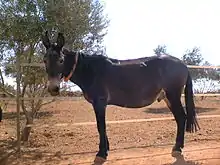በቅሎ
Amharic

በቅሎ።
Alternative forms
- በቍሎ (bäḳʷlo) – Old Amharic by-form, plural also አባቍልት (ʾäbaḳʷələt)
Pronunciation
- IPA(key): /ˈbəkʼlo/
- Hyphenation: በቅ‧ሎ
Usage notes
- The gender of በቅሎ depends on the natural gender of the referent. As such, it may be translated as either he-mule (masculine) or she-mule (feminine) depending on the context. If the natural gender is unknown, the feminine gender is used.
Declension
Definiteness forms of በቅሎ (bäḳlo)
| Masculine | Feminine | |
|---|---|---|
| Indefinite | በቅሎ (bäḳlo) | |
| Definite subject | በቅሎው (bäḳlow) | በቅሎዋ (bäḳlowa) በቅሎይቱ (bäḳloyətu) በቅሎይቷ (bäḳloyətʷa) |
| Definite object | በቅሎውን (bäḳlowən) | በቅሎዋን (bäḳlowan) በቅሎይቱን (bäḳloyətun) በቅሎይቷን (bäḳloyətʷan) |
| General object | በቅሎን (bäḳlon) | |
Possessive forms of በቅሎ (bäḳlo)
| Singular | Plural | Formal | ||
|---|---|---|---|---|
| First person | በቅሎዬ (bäḳloye) | በቅሎዋችን (bäḳlowaččən) | — | |
| Second person | m | በቅሎህ (bäḳloh) | በቅሎዋችሁ (bäḳlowaččəhu) | በቅሎዎ (bäḳlowo) |
| f | በቅሎሽ (bäḳloš) | |||
| Third person | m | በቅሎው (bäḳlow) | በቅሎዋቸው (bäḳlowaččäw) | |
| f | በቅሎዋ (bäḳlowa) | |||
References
- Thomas Leiper Kane (1990), “በቅሎ”, in Amharic-English Dictionary, Wiesbaden: Otto Harrassowitz, →ISBN
- Wolf Leslau (2000) Introductory Grammar of Amharic, Wiesbaden: Otto Harrassowitz, →ISBN, page 12
- Enno Littmann, editor (1943), “Altamharisches Glossar. Der Wortschatz in den „Canzoni Geez-Amariña“”, in Rivista degli studi orientali, volume 40, page 489a
Argobba
Alternative forms
- በግሎ (bäglo) (Aliyu Amba)
References
- Leslau, Wolf (1997) Ethiopic Documents: Argobba: Grammar and Dictionary (Aethiopistische Forschungen; 47), Wiesbaden: Harrassowitz Verlag, →ISBN, page 195
This article is issued from Wiktionary. The text is licensed under Creative Commons - Attribution - Sharealike. Additional terms may apply for the media files.